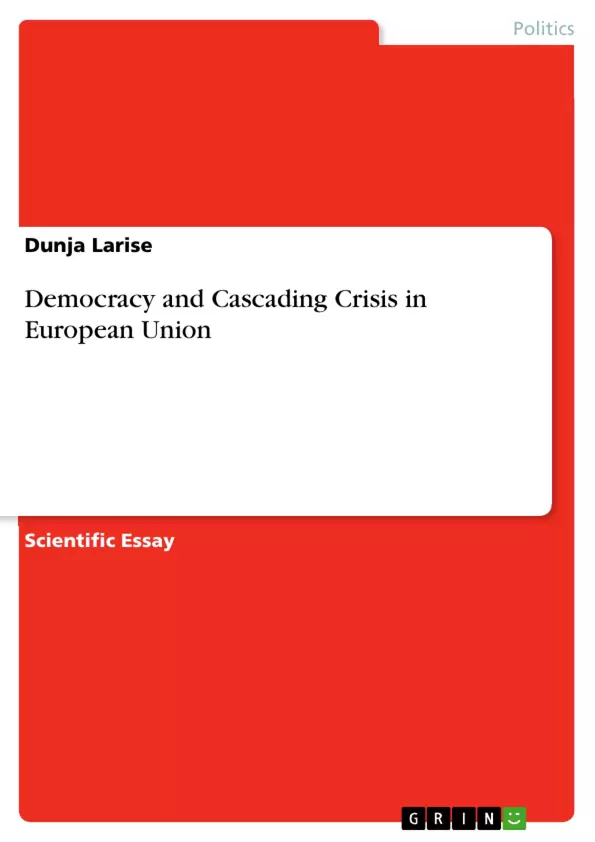This essay follows two main lines of argument. The first is that the critical issue in the current political and social crisis in the European Union is the lack of democratic representation and control. The crisis in the European Union is not one but many, shifting its many forms between financial, economic, social, and political domains.
The second line of argument might be read as a direct reversal of Friedrich von Hayek's conclusions elaborated in "The Road to Serfdom". He claimed that the state regulation of the economy and finances bears the seed of the future fall into authoritarian rule. The author takes an opposite stance, urging that the unregulated market economy and its proneness to financial hazard, the consequence of which are financial crises and major destabilisations of economies and social security of the citizens, is potentially even more direct a road towards an authoritarian rule and that the elements of such developments can already be traced in Europe.
Inhaltsverzeichnis (Table of Contents)
- Introduction
- Democratic Government
- Hidden Oligarchy
- European regulatory state or the Source of Permanent Crisis
- Austerity
- The migration crisis
- Prospects
Zielsetzung und Themenschwerpunkte (Objectives and Key Themes)
This work analyzes the cascading crisis in the European Union, exploring how a series of interconnected events, from the financial crash of 2008 to the migration crisis and Brexit, have unveiled fundamental flaws in the EU’s democratic institutions and governance. The author investigates the roots of this crisis, tracing its origins to the rise of neoliberal policies, the erosion of representative democracy, and the emergence of a hidden oligarchy.
- The impact of neoliberal policies on European democracy
- The erosion of democratic governance and the rise of a hidden oligarchy
- The interconnected nature of the financial, economic, social, and political crises in the EU
- The role of austerity measures in exacerbating social and political tensions
- The challenges posed by the migration crisis and the rise of populism and Euroscepticism
Zusammenfassung der Kapitel (Chapter Summaries)
- Introduction: The chapter introduces the concept of a systemic crisis as a condition that reveals inherent contradictions and deficiencies within a system, ultimately leading to its breakdown. It uses this framework to analyze the cascading crises in the European Union, emphasizing the interconnectedness of financial, economic, social, and political instability.
- Democratic Government: This chapter delves into the principles of democratic government established during the Enlightenment, highlighting the importance of representation and separation of power. It examines the evolution of these principles in modern liberal democracy and the challenges they face in the context of neoliberal ideology and the rise of populism.
Schlüsselwörter (Keywords)
The key keywords of this work include: European Union, democracy, crisis, neoliberalism, austerity, migration, populism, Euroscepticism, hidden oligarchy, financial crisis, economic crisis, social crisis, political crisis, representative democracy, behavioral democracy, institutionalism, and the European regulatory state.
Frequently Asked Questions
What is the central issue of the current crisis in the EU?
The author argues that the lack of democratic representation and control is the core problem within the European Union's cascading crises.
How does neoliberalism impact European democracy?
Unregulated market economies and financial hazards are seen as potential paths toward authoritarian rule, reversing Hayek's famous thesis.
What is meant by a "hidden oligarchy" in the EU?
It refers to the shift of power from representative democratic institutions to non-elected regulatory bodies and elite interests.
How did austerity measures affect social stability?
Austerity exacerbated social and political tensions, fueling the rise of populism and Euroscepticism across member states.
Is the crisis in the EU purely financial?
No, it is described as a "cascading crisis" that shifts between financial, economic, social, and political domains.
- Quote paper
- Dunja Larise (Author), 2021, Democracy and Cascading Crisis in European Union, Munich, GRIN Verlag, https://www.hausarbeiten.de/document/1289051


